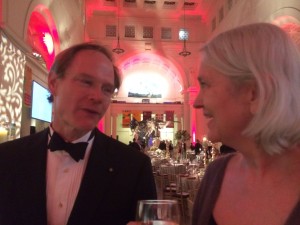A Spacewalk With Joseph Frank’s “Spatial Form”
(For “The Novel as a Form of Thought,” a conference commemorating Joseph Frank, Committee on Social Thought, University of Chicago, May 15-16, 2014.)
Joseph Frank was fully developed before he came to the Committee on Social Thought. His essay “Spatial Form,” first published in the Sewanee Review in 1945, is an astonishing piece of synthesis when you consider the state of play at the time. Joe Frank, born in 1918, had already at age 27 the stylistic authority and the full deck of reference that we find in his older contemporary Clement Greenberg, for example; but Greenberg, who preceded Joe at Erasmus Hall High School, had a proper BA (Phi Beta Kappa) from Syracuse, whereas Joe cobbled together his few semesters of college education between bouts of paid work and was largely educated through talking with freelance or underemployed intellectuals. Later, joining the class of underemployed intellectuals as a copy writer for the Bureau of National Affairs in Washington D.C., Joe was again walking in Greenberg’s footsteps; Greenberg’s non-academic jobs were with various federal agencies until he became a full-time editor at Partisan Review and The Nation in the 1950s. And like Frank, Greenberg made a strong impression with an early essay, in his case “Avant-Garde and Kitsch” (1939), which showed him to be fully up to date with the conversation about art, ethics and politics then underway in what would later be known as the Frankfurt School.[1]
Joe’s biography is too big a subject for me today. My reason for enumerating these facts and making the parallel with Greenberg is this. For people who came of age in the 1930s and 40s, art mattered in a way that we can hardly recover, even as a theme for nostalgia. It was important to discern what made modern literature and art modern, because in the adequate description of those representational artifices lay, one thought, a diagnosis of the spirit of the age, and it was important to get that right. Part of the reason lay in the contending teleologies of the day, theories of history with vastly divergent political formations behind them, structures of intention that claimed the power to determine one’s day-to-day actions and options. How we got where we are today, in a much weakened state of mind, onlookers if not scroungers at the remote edges of a frightfully well-financed commercial culture, is a complicated story. You have heard the recurrent laments for the demise of the public intellectual, specifically the sub-species of public intellectual whose habitat was outside the universities. From a U.S. point of view, the relative but steady rise in living standards, the massification and commodification of university education, and the cultural assimilation of previously excluded groups must all have had something to do with it, as these generally good things both undermined the cause of the Left as people of the 1930s understood it and broke down the difference between high culture and mass culture. If “Spatial Form” had been published in 1965, it would have been an academic, formalist exercise, and it’s often been mistaken for one since.




